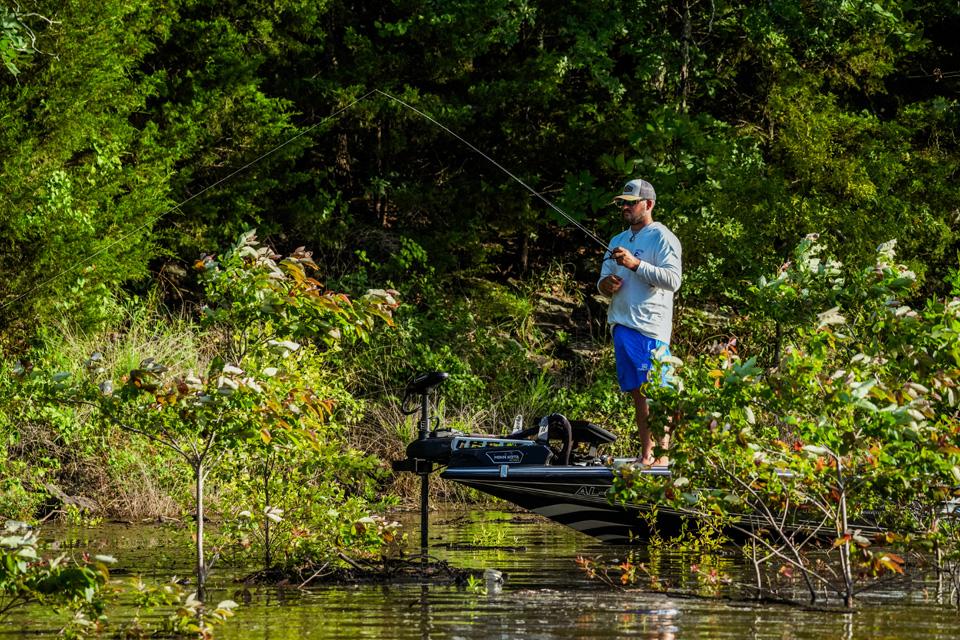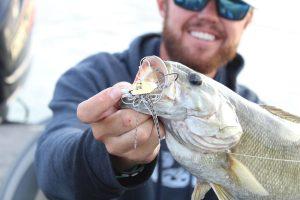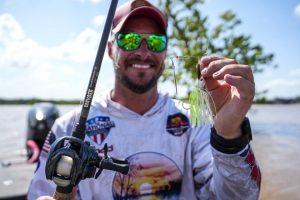Story by Ken Duke | Photos by Tanner & Travis Lyons
I am a fanatic about the language and jargon of bass fishing. I have created entire glossaries of bass fishing terms for bass organizations, and I cringe when anglers—often experienced, otherwise intelligent anglers—use the wrong word or term of art.
My pet peeve bass fishing words are “cover” and “structure.” They are not interchangeable. Cover is something that a bass might use as an ambush point, like a stump, weed bed, or dock piling. Structure is substrate and contour changes, like a channel, point, or drop off.
Please, in the name of all that’s good and decent in this world, use those words properly.
Another pet peeve bass fishing term for me is “Texas rig.” The Texas rig is the most venerated of all methods for rigging soft plastic worms, lizards and more. It came out of East Texas—near Lake Tawakoni—in the late 1950s and early ’60s, and it transformed the plastic worm from a curiosity with beads and spinners into the greatest bass catching lure type of all time. It was so impactful that the first and biggest soft plastic manufacturer of the day—Creme Lures—moved its offices from Ohio to Texas.
A lot of anglers will tell you that they fish a weightless stick worm Texas-style. This is not accurate. To rig a bait Texas style requires a slip sinker. No slip sinker = no Texas rig. Simple as that. What these erroneous anglers are describing is a “self-weedless” rig.
Can you feel my blood pressure rising? This stuff probably bothers me more than it should!
There are other terms that anglers get up in arms about when maybe they shouldn’t. My favorite example is the word “bronzeback.”
If you’re a bass angler, and especially if you live near or north of the Mason-Dixon Line, you’ve heard the word “bronzeback” used many thousands of times to describe bass—smallmouth bass. But I’ll bet you didn’t know that the word “bronze” was used to describe both the largemouth and smallmouth bass in James Henshall’s Book of the Black Bass—the very first book ever written about bass and bass fishing in 1881.
And Henshall wasn’t nearly the first to use the word “bronze” to describe bass. As near as I can tell, the first use of the word “bronzeback” to describe bass occurred in an 1869 issue of Forest and Stream magazine. From there it popped up now and again in newspapers, other magazines, and books.
But it wasn’t always used to describe smallmouth bass. Quite often it was used for largemouth bass, even largemouth bass from the Deep South … even bass from Florida.
Throughout most of the 20th century if you saw or heard the word “bronzeback,” you couldn’t tell without more context whether a person was talking about largemouths or smallmouths or both. The word was basically interchangeable, but that usage began to shift in the 1970s. By the ’70s, if someone said or wrote “bronzeback,” you could be about 90% sure they were talking about smallmouth bass, And by the ’80s, you’d get a strange look if you used “bronzeback” to refer to largemouth.
I can’t think about the word “bronzeback” without thinking of a kerfuffle that happened in the late 1980s or early ’90s when a Florida outdoor writer named Max Hunn used the word in a magazine article about a Florida lake. Hunn was in his mid 70s by then and had certainly seen the word used to mean a variety of different fish, so when he called Florida bass “bronzebacks,” he thought nothing of it. But the readers of that article came out with torches and pitchforks to blast him in several letters to the editor, which—outrageously—the magazine published.
I say, “outrageously,” because the editor is the guy who chooses which articles to publish. He would have read the article. He would have seen the word. He would have been the one to decide to take it out or leave it in.
Not only did the editor leave the word in, but he also let the readers slam a writer unfairly and unnecessarily. It was a low blow from a disreputable editor.
Of course, words change over time. Our language evolves and we adapt with it, or we become out of touch.
Maybe I’m becoming out of touch on the whole “cover” and “structure” thing. Maybe time will erode the distinction so that I’m just whistling in the wind. Or maybe time will be on my side … for a while longer at least.
It was easier to hold onto the standardized meanings of words when there were fewer outlets, a time when everyone with a keyboard and internet connection did not contribute to the lexicon.
Eventually, common parlance will prevail. For now, though, I plan to keep on tilting at this windmill.





